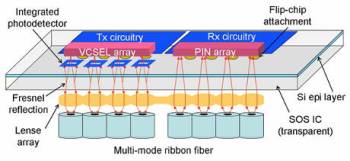Oct 14 2010
C-MAC MicroTechnology, developer of microelectronic units, will manufacture a new 10 Gbit/s optical transceiver for space and military applications. The optical transceiver will be based on Ultra Communications’ electro-optical transducers.
 Electro-Optic Engine
Electro-Optic Engine
C-MAC stated that the 10 Gbit/s optical transceiver will be capable of meeting the requirements of the avionics optical data bus needs. Initially, the transceiver will offer four receive and four transmit optical channels functioning at 2.5 Gbit/s by utilizing the optical core from Ultra Communications.
Bob Hunt, C-MAC’s Head of Technology, commented that the electro-optic engine from Ultra Communications is an exceptional device. The electro-optical transducer features a feedback control within it. The feedback control allows C-MAC to sustain wavelength and output power and to enable bit error rate correction and identification. The transducer also has an optical time-domain reflectometry feature, Hunt added.
The optical time-domain reflectometry enables C-MAC’s on-device microcontroller to alter the output of the laser in order to compensate for specific fiber aspects. The optical transceiver will be based on an MPU, an optical core and a low-temperature co-fired ceramic substrate (LTCC).
The optical transceiver follows C-MAC’s STANAG 3910 optical transceiver, which is used on Eurofighter. The sampling of the optical transceiver will begin from June 2011.